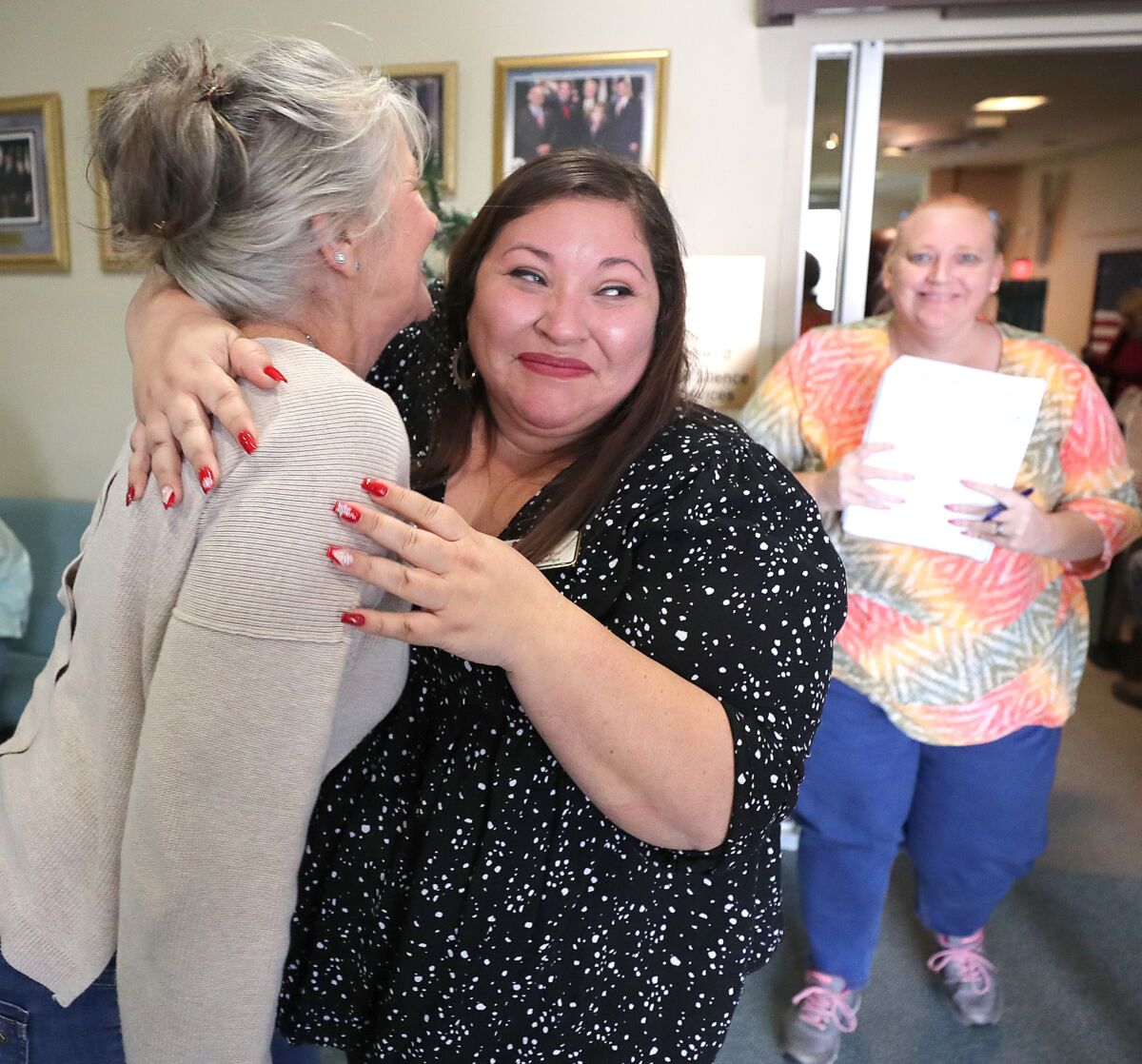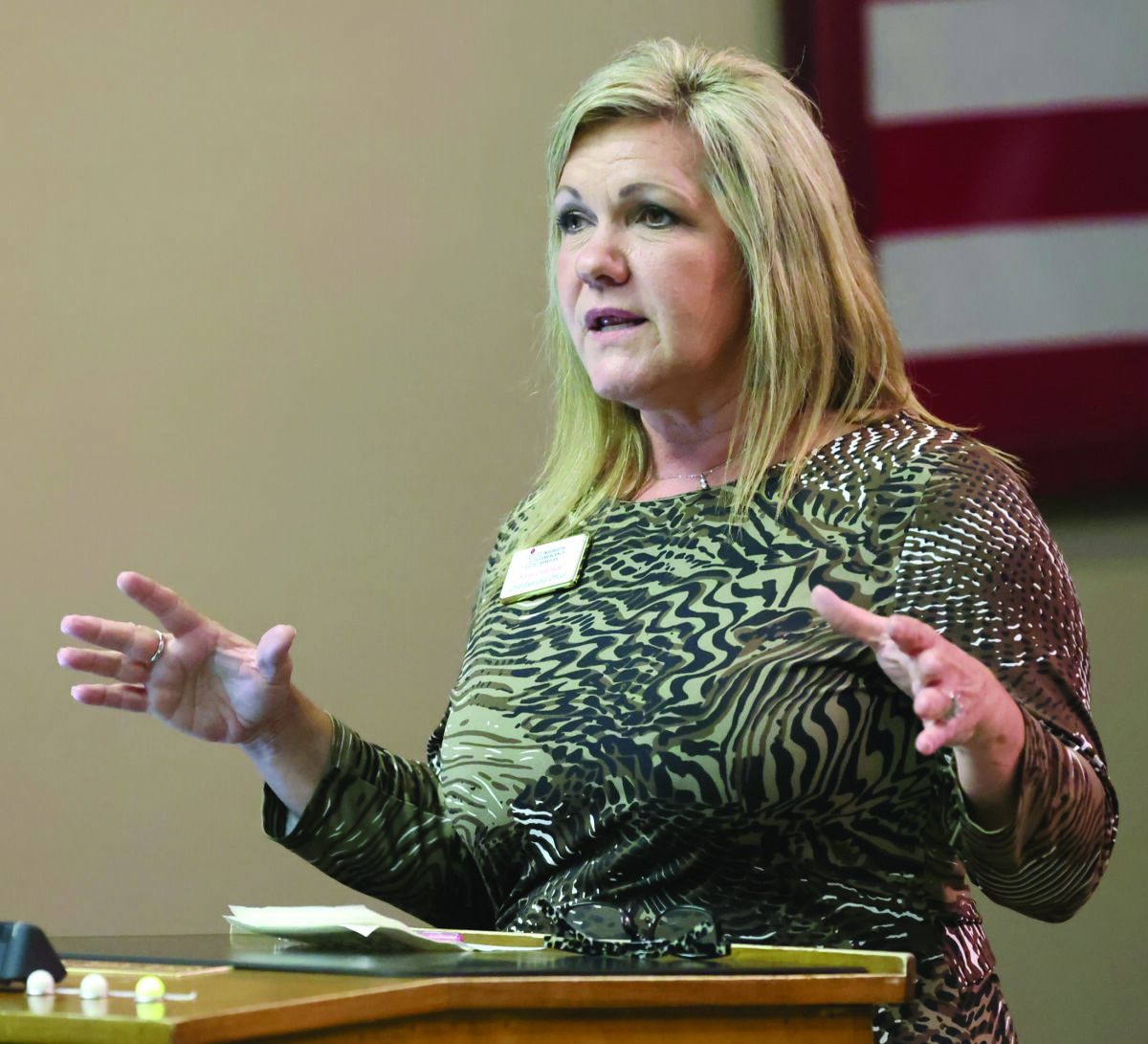MCBOCC approves Interfaith purchase of 14-unit complex for permanent support housing

Jessica Rodriguez, the director of ministries for Interfaith Emergency Services, center, gets a hug from Rebecca O’Connor, an Interfaith Board Member, left, as other Interfaith supporters leave the County Commission auditorium after the Marion County Commission voted during the County Commission meeting in Ocala on Tuesday, Dec. 7, 2021. [Bruce Ackerman/Ocala Gazette]
Upon first hearing of the board’s approval, CEO of Interfaith Emergency Services Karla Grimsley-Greenway said she was immediately filled with elation.
“It almost feels surreal,” she said Tuesday afternoon after the vote. “It seems like a dream that finally came true. We have watched this homeless population suffer for so long, and for years, we wondered, ‘What hope was there?’ This is a step in the direction of hope for these people.”
The complex is located off N.E. 14th Street and was previously owned by Arnette House, Inc., who had previously used the property to run a program for local youth aging out of foster care in 2007. That original program hasn’t been in operation since 2010.
“To be honest,” Grimsley-Greenway added, “I don’t think it really sunk in that in happened until I was in a meeting an hour after [the vote] …that’s when it hit me, ‘This is really going to happen.’ We’re just beyond excited and looking forward to changing the lives of these individuals. They deserve it.”
Interfaith and Arnette House had previously established a closing date on the sale for Dec. 31 or sooner, but because the building was originally purchased by the county using federal dollars from the Department of Housing and Urban Development (HUD), the sale of the building was contingent on MCBOCC approval, who manages the lien on the property.
The unit was appraised at roughly $1.2 million. Interfaith added another $100,000 above appraisal cost, said Grimsley-Greenway, adding that Arnette House was being generous with its sales price.
“Arnette House actually passed on an opportunity to profit from the sale of this property to ensure that it could continue to house low-income families,” she said. “Their board should be praised for that and for caring about this community.”
Along with on-site management, the program also features wrap-around services such as trauma counseling, while targeting to help people that are intellectually disabled or suffer from mental health issues.
“These people are the ones who are being preyed on,” said Jessica Rodriguez, director of ministries for Interfaith, at Tuesday’s meeting. “We’re talking about people who have intellectual disabilities, who are mild or moderately mentally-handicapped. They need our help.”
For starters, six individuals have already been vetted and chosen to be housed in five of the six units in the complex. One unit remains open and available for a possible live-in security or police officer. The other eight units are already occupied by low-income families who will remain on site.
Interfaith board member Kent Adams said during Tuesday’s meeting that if the board neglected to approve the sale of the building, those eight families would be at risk of becoming homeless themselves.
“If this complex ceases to be a low-income property, where will they next go?” asked Adams of the board. “We got to address this problem. We keep kicking this can down the road, but it doesn’t go away. It just becomes someone else’s can.”
Adams also emphasized that Interfaith is not “picking willy-nilly who gets to go there.” The program thoroughly and carefully vets each possible candidate for permanent housing.
Mary Beth Neely, who lives off S.W. 99TH Circle, urged the board to approve the sale Tuesday morning.
“This project is good for all of us in Marion County,” she explained. “It protects and helps give a living to vulnerable people. It reduces the amount of homeless people on the street.”
She further said that her church, Fort King Presbyterian, had voted to sponsor one of the apartments and its resident or residents.
“We’ve already begun to collect needed furniture and home necessities,” Neely added. “We will support the residents in small and important ways. It is our hope that other churches will do the same.”
Rebecca O’Conner, an Interfaith board member, spoke before the commission on Tuesday, explaining that she had once been homeless herself.
“I have been evicted,” she said, fighting back tears. “I’ve lived in hotels. But I’ve been working for a long time now and I’m no longer homeless.”
O’Conner said further that it had been 40 years since she had been homeless and could probably live anywhere in Marion County now that she wanted to, but she chooses to live about six doors away from the low-income housing complex, because—she emphasized— “They’re no different than we are.”
“We’re not asking you to take care of them,” she added. “We’re asking you to give us the opportunity to take care of them.”

Karla Greenway, the CEO of Interfaith Emergency Services, speaks to county commissioners in Ocala on Tuesday, Dec. 7, 2021. [Bruce Ackerman/Ocala Gazette]
“We’re not certain who exactly the clients that are going to be in this facility,” he said. “If it’s the clients that are going to be taken care of by Interfaith, that’s wonderful. We don’t have, with this police department, any issues with that. The issues we have are the activities that go on around Interfaith: the violence, the robberies, the stabbings, the drug sales—inside and outside the secured area—prostitution.
“So, if the goal is to move some of that population over to 14th Street,” the mayor concluded, “then that’s obviously going to be a problem.”
Grimsley-Greenway addressed the mayor’s comments during her portion of the hearing.
“It’s disturbing to me that Interfaith, which does so much good, should be associated with so much violence,” she said. “We are not law enforcement. We are not mental health professionals. That’s not our wheelhouse. We’re not a substance abuse center. Though, all of those things do plague the homeless population of Ocala—and they all come [to Interfaith] to eat.
“We try to help the most vulnerable in Marion County,” Grimsley-Greenway explained. “The people that we’re focused on with this project are the very ones who are being assaulted or trafficked or put in danger.”
Later that afternoon, during the city council meeting, council member James Hilty took the opportunity to praise the decision of his county counterparts. “I applaud the county commission for seeing that we need to do something to solve this problem. We have a lot of people working in the community, working towards it. I think with the city and county formation of the complete agency, we are moving in the right direction.”





